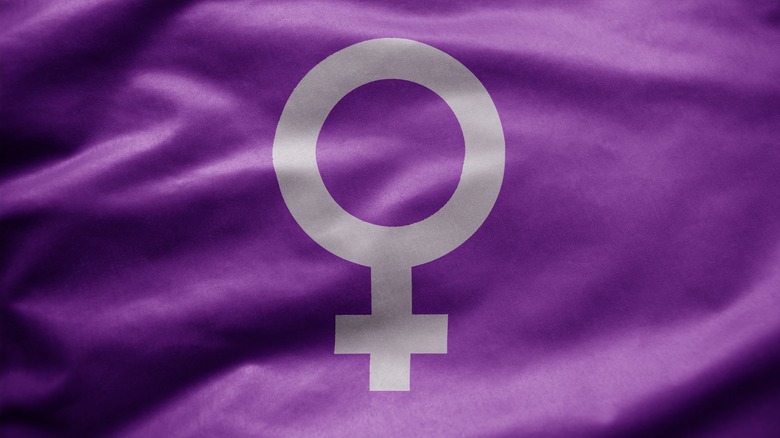Things Only Adults Notice When Reading The Bible
Chances are, one's first introduction to the Bible is in Sunday school and sermons, and that can be an awfully ... sanitized experience. Stories are spin-doctored, genocides are skipped over, and everybody comes out smelling like a rose, or get their just desserts because they were "bad."
That's the story children get. But what happens when the Bible is re-read from an adult perspective? With the Enlightenment, civil rights, feminism, and science backing us up, the rose-colored glasses come off and we see Bible more for what it is: not a book so much as a library, written and added to over the course of thousands of years by at least 44 scribes. Beyond its moral aspect, the Bible is a historical document, national epic, and genealogy.
Also gone is the blind acceptance we had as children; with adulthood comes independent thought. We see the heretofore virtuous Lot offer his daughters to the rabble, the supposedly-faithful Saul consult a pagan because God failed him, and the war with the Midianites not as goodie-vs.-baddie, but as a wholescale rape and genocide. We see the Israelites not as knight-like figures, but as seriously flawed human beings, and their god is not always what the world calls "omni-benevolent." We also see that Church and Bible do not always agree, to say nothing of the Church, the Bible, and the year 2022. Read on to see just how much.
The Bible Is pro-slavery
There is no way around it; not only does the Bible advocate slavery, it even gives instructions to the Israelites on how the practice is to be carried out — and nowhere does God chime in his disagreements on the matter. Leviticus 25:44-46 lays the concept out in simple language: provided one Israelite is not enslaving another, anyone is fair game. The passage begins with "Your male and female slaves are to come from the nations around you; from them you may buy slaves," and even temporary residents passing through can, provided they are not native, be enslaved. The passage stipulates slaves are property and can be bequeathed as inheritance.
The New Testament is no better; there is no quarter for the idea of a slave wanting to be free, to say nothing of trying to achieve freedom. Ephesians 6:5 browbeats slaves into obedience by saying, "Slaves, obey your earthly masters with respect and fear, and with sincerity of heart, just as you would obey Christ."
The only mitigating factor to this is that the Israelites were in good company. According to Britannica, Biblical contemporaries in China, India, Japan, Korea, Rome, Greece, Southeast Asia, Africa, Mesoamerica, and other societies of the time (and before and after) were slave-owning. This includes ancient Israel's immediate neighbors in Egypt and Mesopotamia. It was only after 1776 that the idea of "all men are created equal" began to take hold as a cry for universal freedoms.
Where did Mrs. Cain come from?
This is a Biblical golden oldie. Adam and Eve are the only humans on the planet, a distinction later extended to their three children, Cain, Abel, and Seth. But after Cain was exiled for murdering Abel, Genesis 4:17 clearly states he had a wife and fathered a son, Enoch. Who is this woman? Where did she come from? Why does the Bible never mention her before or after this one reference? And how was she convinced to shack up with the world's first murderer? Was it Eve? The Bible is silent.
"Cain's Wife" represents one of the biggest plot holes in the Biblical narrative. Genesis 5:4 does say that Adam had other sons and daughters after Seth, but this is the only sentence where their existence is explicitly mentioned. For the lack of any other candidates, Biblical scholars assume Cain married one of those sisters. This opens up the raucous debate of incest in the early Bible, of how it was a viable means of population expansion at one point (with genetic dangers that seemingly did not happen), and then wasn't, and those dangers suddenly became manifest.
At least two Abrahamic traditions state incest is exactly what happened, come what may. Per the Book of Jubilees, both Ethiopian Christians and some Jews believe Cain did indeed marry a sister and even give her name: Awan. Protestantism, Catholicism, and Eastern Orthodoxy do not recognize Awan, however (via Christianity.com). Cain's wife remains a question mark.
To whom does God repent?
In Genesis 6:6 and 1 Samuel 15:10-11 of the King James Bible, God "repents." Which gives rise to the understandable question of: to whom? Was there another power in the Bible? Perhaps one that was edited out over time, and the scribes involved simply missed a few references? Author Dan Brown broached that theory in "The Da Vinci Code," where one of the subplots was that ancient church elders had misogynistically erased the presence of a female counterpart to God. Several Christian sources skip that uncomfortable scenario altogether, however, and favor a simple linguistic misunderstanding of the word "repent."
Christianty.com posits that when God "repents," he changes his mind. But this leads to the even more illogical situation that when a human, in the Bible or not, "repents," forgiveness for some kind of acknowledged failure is requested, but when God "repents," a course of divine action has or should be changed.
Perhaps to duck out of the debate entirely, some versions surreptitiously change the wording. For Genesis 6:6, while the King James and American Standard bibles use "repent," several other versions — the New International Version, the New American Standard, the Good News Translation among them — opt for "regret," a word that not only completely changes the semantics of the passage, but keeps various congregations in the dark to the original question.
Jesus does not condemn homosexuality
Americans of a certain ilk will howl otherwise, but in Matthew, Mark, Luke, and John, Jesus never denounces homosexuality. That in and of itself is a sharp break with the Old Testament, but Jesus, an unmarried man who preferred the company of other 13 men, goes one step further. He may even support it.
In the New International Version, Luke 7:1-10 contains a passage described by scholars as "The Faith of the Centurion," where a gentile (not Jewish) soldier asks Jesus to heal his servant, something the Son of God does. Biblical linguists admit, however, that "servant" in this verse is an English mistranslation of the Greek word "pais," which means "lover." Specifically, it means the junior or younger man in a homosexual relationship. Yet Jesus never asks for clarification, and in fact, nowhere in Luke 7:1-10 does he even balk, decry, or start pontificating about the love life of the centurion.
Rather, he is "amazed" the soldier asked with such faith and dutifully heals the pais, no questions asked. Essentially, Jesus healed the boyfriend of another man knowing exactly who was what to whom and without so much as a peep of condemnation. If there are any harsh words at all in Luke 7:1-10, it is when, after Jesus heals the pais, he remarks that a pagan had more faith in him than the rest of Israel.
Child murder is condoned
Jesus may not have thought so, but it is clear the Bible has a special word for children: "targets." Children are a cheap commodity in the Bible, and child murder is regularly given divine consent. The Bible is already violent, so much so that religion historian Philip Jenkins notes several examples where God orders what amounts to ethnic cleansing. And while it is a sad fact that children are inevitable victims of war or natural disaster in the Bible (and out), there are several high-profile passages where God or the Israelites kill children specifically, calling into question the morality of both.
Untold numbers of children were collateral damage in Sodom and Gomorrah and the Flood, but in Hosea 13:16, children are targeted specifically. In Deuteronomy 2:33-36, children are slaughtered in a genocide. There is then the matter of the children of Job, who are killed in the game God and Satan made of the man's life to see how much ill fortune it takes to make him break. Their fates after death are not given.
Then there is Passover, when Moses demanded freedom from the yoke of the Pharaoh. This called upon the power of God, but rather than taking it up with the King of Egypt himself, God annihilated the firstborn children of the Nile Valley. Children who had no idea who Moses was, his issues with the Pharaoh, God, and possibly even the Pharaoh. But because God prevailed, "it's all good," so to speak.
Women get a raw deal
Feminists have long decried the position of women in Bible. 1 Timothy 2:11-14, 1 Corinthians 11:3, and 1 Corinthians 14:34-35 all equally state in no uncertain terms that women are subordinate to men, no questions asked. Women can be killed if they are not virgins on their wedding night, and even be obligated to marry their rapist. Women are even monetarily worth less than men.
In broad strokes, it can be argued ancient Israelite culture is misogynistic even by the standards of the time. According to UsHistory.org, contemporaneous Egyptian women could own businesses and property, instigate divorce, be in the company of men, serve in court cases, be priestesses, and even rule the state, rights also largely enjoyed in Mesopotamia (via History on the Net). Etruscan women could inherit property, mingle with male peers, own businesses, and serve as head of household. In militaristic Sparta, all able-bodied men had to be in the army, thus, the city's civil society was run by women.
The blatant gender disparity spawned several feminist takes on the Bible, particularly the views of women by Jesus. Christianity.com notes that Jesus freely mingled with women and some of them bankrolled him. Feminist reexaminations also led to rehabilitations of certain characters; per Smithsonian Magazine, while Mary Magdalene was long condemned as a sex worker by later church fathers, feminists note the Bible never calls her that.
The apple is a red herring
It is a common idea that Adam and Eve were expelled from Eden for disobeying God by eating the apple (or whatever it was that fruited from the Tree of Knowledge). This occurs in Genesis 3:23, but the real reason God threw them out is actually just a sentence before.
After throwing a major tantrum at the serpent for its deception (Genesis 3:14-15), cursing Eve with painful childbirth for her gullibility (Genesis 3:16), and condemning Adam to a life of hard labor (Genesis 3:17-19), God gives the grand reveal. In Genesis 3:22, He says, "The man has now become like one of us, knowing good and evil. He must not be allowed to reach out his hand and take also from the tree of life and eat, and live forever." It is only after this proclamation that Adam and Eve are exiled.
This suggests that immortality, not disobedience, is God's issue. Genesis 3:22 does several things at once; firstly, it clarifies that Adam and Eve, even in their Eden hayday, were made to die from the start. Secondly, it opens up the debate on God's character regarding the prospect of immortal humans — was he angry? Fearful? Jealous? Thirdly, it begs the question of why is immortality a bad thing here when "eternal life" is promised elsewhere? Fourthly, to whom is God talking? The Bible is silent.
What's in a marriage?
Betty Bowers, the hell-on-heels Republican alter ego of comedian and satirist Deven Green, uploaded a wildly popular YouTube post (2.4 million views) on what counts as a "Bible-based" marriage. The piece is written to be comedy, but is nevertheless is a spot-on tour-de-force of incest, rape, murder, and misogyny ... all with divine consent.
Abraham marrying his half-sister? No problem sayeth the Lord! Having that half-sister (Sarah) open up the union to a second woman? All good, quoth the Lord! Going to the next town over and slaughtering all men and non-virgins so as to kidnap the remaining girls and force them into marriage with their captors? Green light, declareth the Lord! Solomon having a harem composed of 700 wives and 300 concubines? Pace yourself, proclaimeth the Lord! In lieu of no sons you pimp out your (possibly unwilling) slave to sire a child on your (possibly unwilling) daughter? Rock on, professeth the Lord! Betty Bowers even includes Deuteronomy 22:28-29, wherein God declares the punishment for raping an unmarried virgin is marriage to the rapist.
After ticking off one crime against humanity after another in the sake of marriage, Bowers-slash-Green signs off by saying that two men marrying is wrong because unlike anything else she mentioned, it alone is "immoral." It is a searing criticism of the Bible and its immutability, and one that rarely makes it into Sunday school.
God made man (and woman?) twice
Genesis 2:7 contains the familiar passage of God creating man out of dust. However, God had already made both man and woman by this point; Genesis 1:27 states "God created man in his own image, in the image of God he created him; male and female he created them."
The competing verses create a lot of discussion. Compelling Truth says that 2:7 is further exposition of 1:27; while another posits that the two different stories come from two different authors writing at two different times in two different traditions from two different viewpoints, and the two were crammed into Genesis at a later date. But 1:27 itself creates questions; two humans are mentioned but not named. While no source argues Adam had a brother, there is controversy around the woman because it might not be Eve.
The debate throws light on a little-known text, the Alphabet of Ben Sira. A medieval Jewish work not recognized by Christian denominations, the Alphabet may be much older, and it expounds on certain points in the Bible, including the creation of man. In it is the story of Lilith, the first woman, and gives rise to the possibility that 1:27 is the vestigial remains of the (heavily edited) tale. Created simultaneously, Adam and Lilith argue over who is superior, ending in Lilith abandoning Adam and Eden and becoming a succubus-like demon. It was only after Lilith that God created Eve from Adam's rib.
Jesus is against marriage
Despite having an opinion on a variety of subjects, Jesus is remarkably minimalist throughout the gospels when it comes to marriage. It is in the Book of Matthew that he gives his two bare-bones views: one is against divorce (Matthew 19:9), which should not be too much of a surprise. But the other is against marriage itself.
In Matthew 19:29, Jesus declares that "every one that hath forsaken houses, or brethren, or sisters, or father, or mother, or wife, or children, or lands, for my name's sake, shall receive an hundredfold, and shall inherit everlasting life." A careful reading of the passage finds that not only is Jesus decrying marriage, he is actively promoting people to exit existing ones in order to serve him better, a statement that also includes walking away from property and any existing family a person may have at that point. But combined, the two verses create a bizarre scenario even for the Bible, one where instead of getting a divorce to end a marriage (which did happen throughout Hebrew history, per Emory University), a true devotee of Jesus should just abandon it instead.
Some early followers go even further; the unmarried Paul the Apostle was so turned off by the very concept of heterosexuality itself that in 1 Corinthians 7:1 he proclaimed "it is good for a man not to have sexual relations with a woman."
God is pro-abortion
It is right there in black and white: In Numbers 5:11-31, in a passage known as the "Ordeal of Bitter Water," the Bible gives instructions on how to induce an abortion on a woman suspected of carrying an adulterously-conceived child. Water is poured into a clay jar, whereupon barley flour and dust from the tabernacle floor are added. She drinks and is then brought before a priest who calls upon God to kill the fetus directly if it is not fathered by the husband. If the woman is innocent, nothing happens. But if she is guilty, the curse is enacted and a "miracle abortion" takes place.
This isn't the first instance where God or the Israelites take a markedly different position on the matter from churches in the modern day. Leviticus 27:5-6 implies a child has no worth until a month after birth, suggesting that "life begins" neither at conception nor birth, but some time after both and making the whole discomfiture over abortion moot.
A far more bloody abortion scenario plays out in Hosea 13:16, where a just punishment for rebelling against God included pregnant women being "ripped open" after all the other children have been killed. Hosea goes even further, where the scribe hopes God aborts fetuses of the enemy. For his part, Jesus says nothing about abortion, nor does he comment on any of the practices mentioned above.
God plays favorites
In a broad sense, of course God plays favorites: the Jews (Israelites) are his chosen people (via Britannica), so it is only natural he favors them over those who worship other gods (and kills nearly the entire human population when they do). But God also plays favorites among the Jews. This leads to a niggling question; is it the fault of the person, or the fault of God? An article at BeautifulChristianLife.com meets the question headlong, noting "God favors Isaac, not Ishmael; Jacob, not Esau; Moses, not Pharaoh; Judah, not Reuben, and on through history until God favors Mary — not any other woman — to be the mother of the Son of God." While some of these relationships make sense (Reuben slept with his father's concubine), others don't. God "hate[s]" Esau, but no reason is given. He just does.
Biblical scribes have scrambled to explain. For example, Genesis 4:5-7 never explicitly describes why God disfavored Cain's sacrifice, only that it was not right, so to speak. But the implications were so massive, later writers in Hebrews 11:4 surmised that while Cain's sacrifice itself was fine, he didn't have faith.
God also actively victimizes innocent people. In numerous passages — Exodus 20:2-6, Exodus 34:6-7, Deuteronomy 5:8-10 — in what under any earthly or mortal circumstance would be a psychotic form of narcissism, God freely admits to punishing one generation for something that happened three or even four generations previously.












